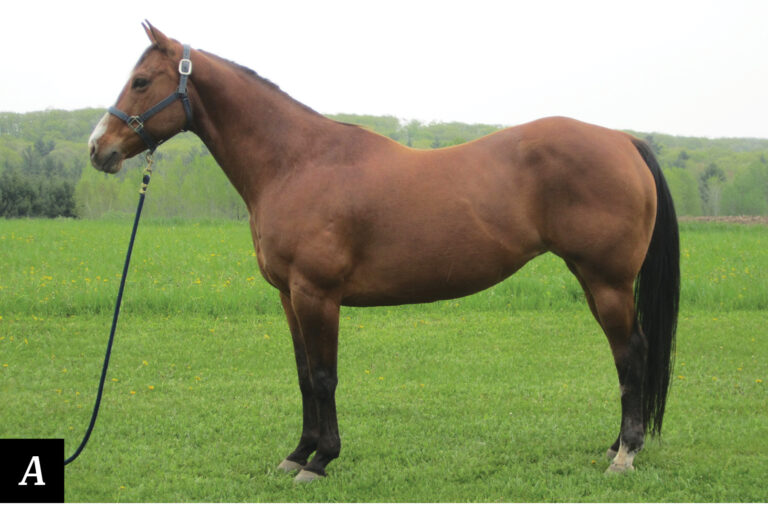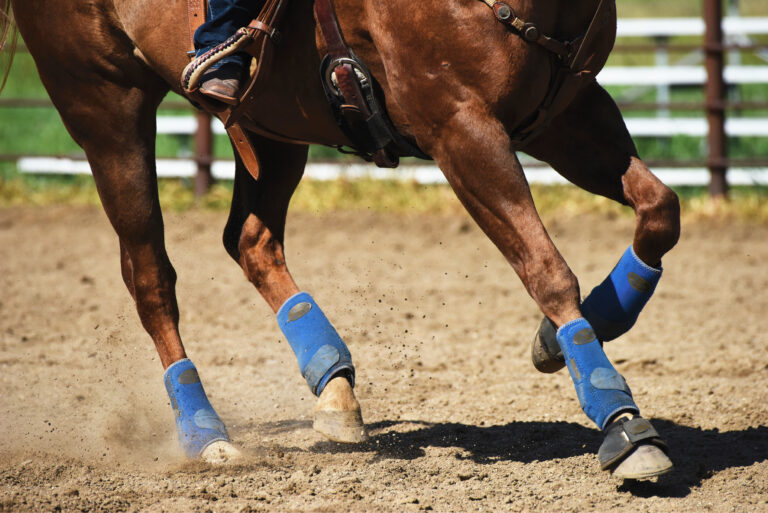This article is part of our Comfort Awareness Campaign brought to you by Bute-Less.
It’s no secret that a long haul in a trailer can be tough on a horse. Especially if we don’t take special precautions to ensure his comfort. Have you ever been driving in your comfortable pickup, maybe with the A/C on and the radio up, and started thinking about how your horse is faring in the trailer?
There are some basics to trailer comfort that shouldn’t be overlooked. These include ensuring the floor is solid in your trailer, that you’re prepped for an emergency, and you’re pulling your trailer with an appropriate towing vehicle. If we go beyond the basics, we can help our horse ride in comfort – and prevent unwanted trailering or loading problems down the road.

Air it Out
If you’ve ever been in an enclosed trailer on a hot day, you know how stuffy it can get. Once you get rolling, it won’t be as bad when air starts blowing over your horse’s back. However, proper ventilation in your trailer is as important to his comfort, as it is to his health.
Keeping fresh air circulating through your trailer will cut down on dust and odors that occur while hauling. Horses are sensitive to airborne irritants, and inadequate ventilation can aggravate respiratory conditions such as heaves. Good airflow reduces the exposure to irritants, promoting a healthier respiratory system, and keeping him comfortable. Vents in the roof can allow air to move throughout the trailer, helping to keep him cool in warmer months. Take into consideration the temperature outside, and if windows or vents should be open to allow ventilation, or partially closed to trap heat inside the trailer when it’s cold. Even during winter, some ventilation in your trailer is important to allow fresh air. If your trailer has drop down windows, this can be a secondary source of fresh air.
Window Safety
Leaving a window open can allow for ventilation and help your horse to not feel claustrophobic. However, leaving windows dropped all the way down without the bars or screen up, can pose a hazard to your horse. Many experts agree that you should not travel down the road with windows wide open. Keep the grate or screen up to allow air flow, while preventing debris from flying into your trailer. Only drop windows fully when parked in a safe area.
If your horse hangs his head out the window as you travel down the road, you’re inviting injury to his face or eyes. Even with the window bars up, a fly mask might be a good idea to protect his eyes from bugs and flying debris. An open window can be disastrous if your horse tries to escape the trailer and gets stuck in the window.
Flooring and Bedding
A slick trailer floor is a dangerous floor. As you roll down the road, taking turns and making stops, your horse performs a balancing act in the trailer. Even the safest driver might have to make an unexpected stop, and you want your horse to be able to stand up safely on the floor. Rubber mats can help provide traction, and there are now many options for slip-resistant trailer flooring that don’t require bedding. There are different opinions about using bedding in the trailer. One camp believes that it cushions the floor for your horse, protecting his joints and legs. Bedding can also soak up urine and provide traction so your horse can stand stable. Some even say that may horses won’t urinate without bedding in the trailer, because they don’t like the splash.
An opposing argument is that bedding in a trailer can be a respiratory nightmare. If you’re providing ample ventilation as noted above, the wind can stir up bedding and send it swirling through the air – and into your horse’s nostrils, eyes, and mouth. Comprises between the two include using large flake shavings instead of finer flakes, wetting down your shavings before travel to avoid dust and irritants, or using soft woods such as fir or pine, as they have less potential for lung irritation. Many seasoned travelers also opt for bedding only on long trips and leave their floors bare except for mats, for shorter hauls.

Give Him a Break
For long hauls, plan out breaks along the way to stop and let your horse relax. A general guideline is to stop for a break every 3-4 hours. Many horses won’t urinate while moving, so this gives him a chance to do so. You don’t need to unload for these short breaks, especially if it’s an unsafe area. Try and park in the shade during warm months and open the trailer door to allow air flow. This is also a good time to check that he’s doing alright if you don’t have cameras in your trailer. (Take this time to also do a thorough walk-around of your vehicle and trailer, checking for any concerns.)
Now is the chance to drop the windows down and let him put his head out. Offer water if you’d like through the window, although he might not take any. When traveling for very long distances, most agree that unloading every 12-16 hours is beneficial for your horse. Only unload your horse in a safe spot, and do so if he’s an experienced traveler that will load again easily.
Keep an Eye on His Health
Long distance hauls can take a toll on your horse’s health. From the vibrations of the roads to the potential accidents that can happen in the trailer, to the stress it can put on your horse – there are always risks. Loading your horse into the trailer can initiate a stress response, triggering the release of cortisol into his bloodstream. Throughout the journey, cortisol levels steadily rise and may remain elevated for up to 24 hours after reaching the destination. This can heighten the risk of transport-related illnesses. Cortisol prompts “act now” emergency mechanisms while temporarily suppressing less-critical bodily functions.
Among the significant impacts of cortisol is its effect on your horse’s immune system. Consequently, your horse becomes more vulnerable to infections, putting him at risk of developing shipping fever—a rapid-onset, life-threatening respiratory infection. Signs of shipping fever may surface as early as four to six hours after departure, occurring in approximately six percent of long-distance hauls.
In addition to the immune system response, transport also induces dehydration in horses due to reduced drinking, eating, and increased sweating. This dehydration elevates the risk of colic, posing potential threats to your horse’s well-being. Keep an eye on your horse throughout your travels, stopping regularly to check on him, and be ready to help him recover at reaching your destination.
Rest and Recover
When we get to our destination, it’s still our duty to keep him comfortable. Plan your trip and travels accordingly to give him some rest time after a long haul. Plan at least one day of rest for a six- to 12-hour haul, and two to three days of rest for a trip that lasts longer than 12 hours.
The average horse loses five to six percent of his body weight during a 24-hour trip due to a combination of dehydration and reduced feed intake. Although half of that weight loss is recovered within the first 24 hours of transit, it can take as long as seven days for your horse to fully recover. So, if he’s facing a particularly long or difficult trip, plan at least a week before your horse will be completely back to normal.
[Read here about keeping him comfortable in his stall]
Keep your horse’s comfort in the forefront of your mind when traveling. A long haul with your equine friend can lead to rewarding and fun adventures – but don’t forget that his health comes first.






